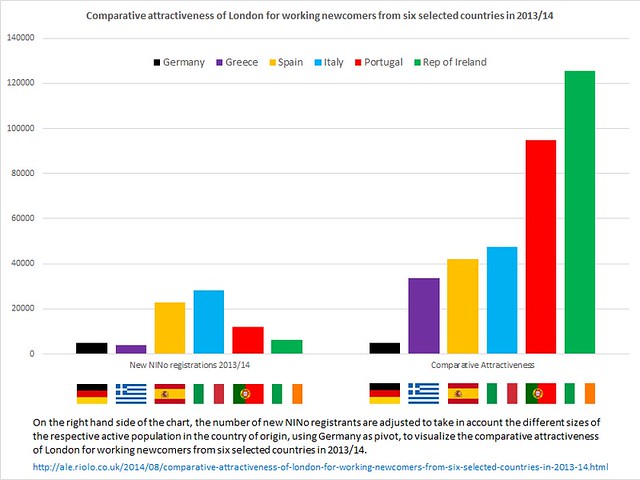A notorious old saying was suggesting that London streets may be paved with gold, even though, as the good old Dick Whittington discovered the hard way all this time ago, this may be practically true only for a very selected bold and lucky few. A multitude of newcomers lands every given year in London nonetheless, hoping perhaps to follow the footsteps of that medieval merchant, "Sir" Richard Whittington, whose rags to riches life inspired the folk tale which popularised the old saying.
While London is seen as a city of opportunity from people from the most disparate, and often desperate, corners of the earth, people from different countries are attracted by London at different levels of intensity. We may in example choose a random sample of six selected countries, let's say: Greece, Italy, Ireland, Portugal, Spain and Germany. By utter chance, all of six those countries are Eurozone member states. Would you expect the active population of the countries in this sample to be attracted by London at the same level of intensity? If so, the following chart may come as a surprise:

The chart is trying to show the comparative attractiveness of London for working newcomers from six selected countries in 2013/14. Specifically, on the right hand side of the chart, the number of new NINo registrants are adjusted to take in account the different sizes of the respective active population in the country of origin, using Germany as pivot, to visualize the comparative attractiveness of London for working newcomers from six selected countries in 2013/14.
Given that the Dublin to London is the busiest passenger air international route, and in general the short distance and the historical ties, it should come to no surprise that Irish are particularly sensitive to the charm of the modern Babylon. Historical ties come possibly into play to help explain the Portuguese fascination with our much desired Cockaigne, as there must be a reason why the Anglo-Portuguese Alliance, well into its seventh consecutive century of life, is the oldest alliance in the world that is still in force. On the other hand, while it is not surprising that, given the current status of the national economy in both Spain and Italy, people from both those countries may currently feel lured by London more than in any other time in recent decades, it is somewhat puzzling to note that Greeks appear slightly less enthralled than their Mediterranean counterparts. Last but not least, looking at how hard is for London to attract Germans, one wonders if this behaviour may be not so much linked with the state of the German economy, but to a completely different class of non economic related issues.

No comments:
Post a Comment